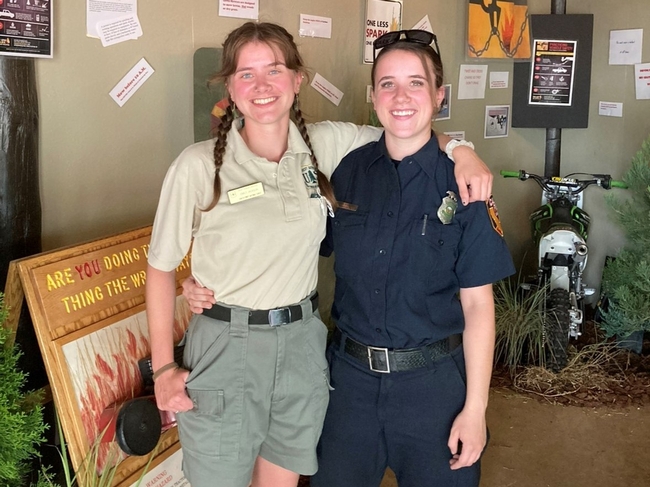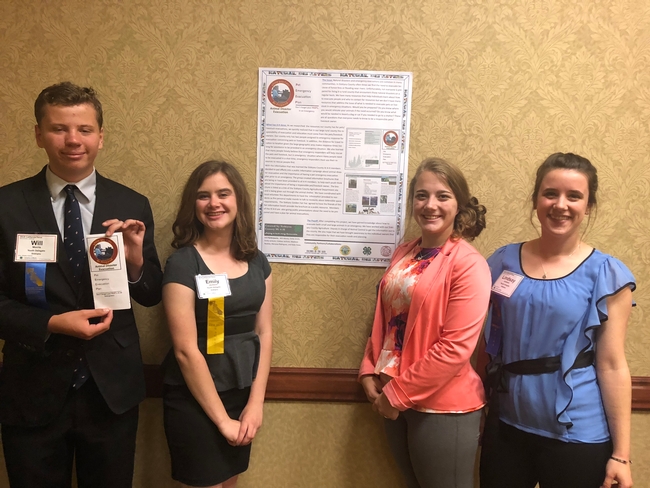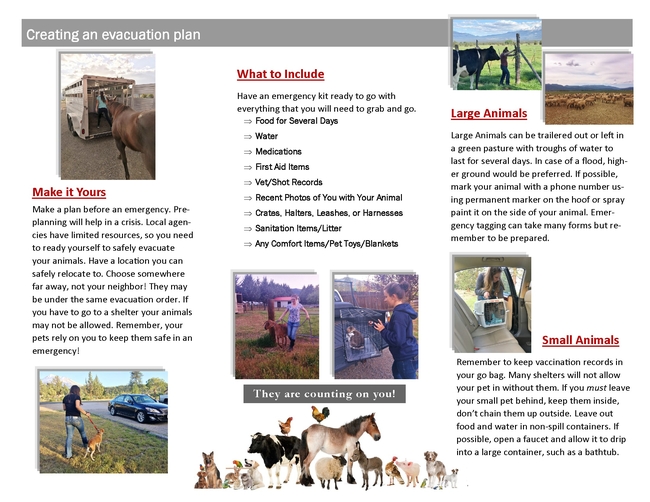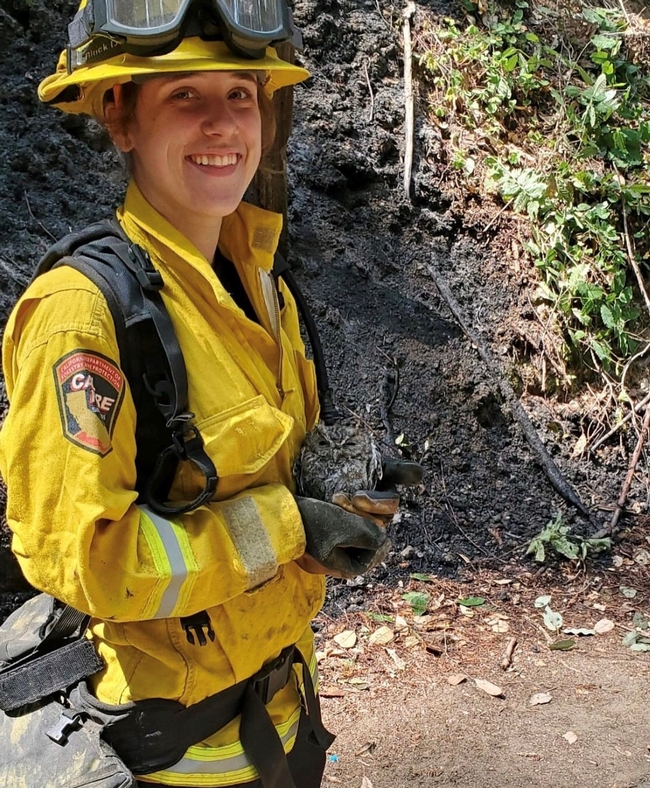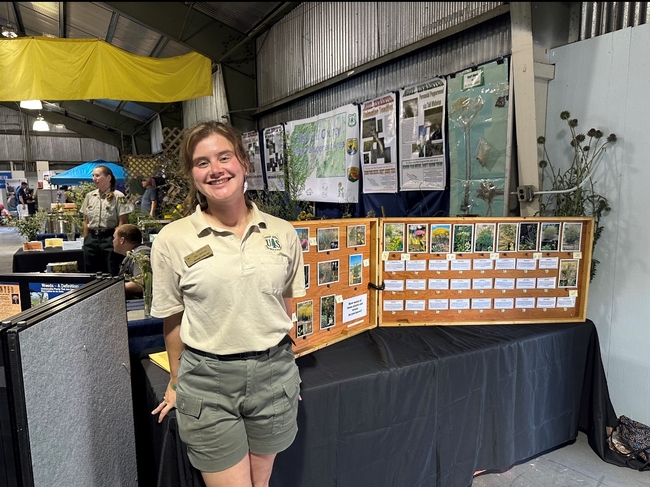Planning brochure for pets, livestock fills crucial need as fires an increasing threat
With the McKinney Fire creeping closer to Yreka in the summer of 2022, Emily Jackson and her mother potentially faced the enormous task of getting all their goats, chickens, dogs and cats to safety – while Emily's father and twin sister Lindsay were away fighting the fires.
Fortunately, Emily and Lindsay had gained crucial knowledge about evacuating animals through a 4-H service-learning project they helped lead in 2018. A group of eight 4-H youths, ages 14 to 18, had created a “Pet Emergency Evacuation Plan” (PEEP) brochure, aimed at educating their neighbors in Siskiyou County about the necessary preparations for livestock and pets.
The brochure, available through the Siskiyou County website, remains in use today in this densely forested region that saw another spate of wildfires this summer. The PEEP project team was composed of Kylie Daws, Emily Jackson, Lindsay Jackson, Will Morris, Madison Restine, Maryssa Rodriguez, Emily Smith and Callahan Zediker.
Within those stressful hours in 2022 when the McKinney Fire prompted an evacuation warning during which residents could be required to leave at any moment, Emily Jackson said she and her mother had a game plan in place – thanks to her work on the PEEP project.
“At the time, it wasn't even on my mind,” Jackson said, “but looking back now, I know that having the experience from making that brochure was driving my thought process at the time.”
And while the Jackson family and their neighbors ultimately were not asked to evacuate in 2022, many community members have benefited from the hundreds of copies of the PEEP brochure in circulation, which prompts residents to at least think about what their animals would need in an emergency, Jackson said.
Pet and livestock evacuation tips were needed
Such a resource previously had not been available among the county's emergency preparation materials, according to Jacki Zediker, the 4-H regional program coordinator in Siskiyou County who advised the PEEP project group.
“One piece that was missing was how to help our communities understand that when they evacuate, and they take their pets with them…it's not as simple as just taking their pets with them,” said Zediker, citing the example that some shelters do not take in animals – or do not take animals without proof of vaccination.
Other items to add to the pet's emergency kit include food for several days, water, medications, comfort items or toys, and recent photos of the owner with their animal (proof of ownership).
Zediker had connected the young people with Jodi Aceves, senior deputy agriculture commissioner/sealer for Siskiyou County, who had been overseeing the county's Animal Control programs and emergency response.
“There's a lot of information out there for people evacuating, but not necessarily for livestock and pets,” Aceves said. “Unfortunately, we have had some fires where there were lots of pets and livestock lost.”
She met several times with the 4-H group, discussing the county's evacuation systems and processes and the role of the Office of Emergency Services and law enforcement agencies, and sharing key considerations in preparing for emergencies – such as having a pre-agreement in place with someone who could house an evacuee's animals.
Aceves praised the teens for distilling the vital information into a short and simple brochure that community members could easily read and remember. She also was impressed by the energy and genuine care that the young people put into the project.
“Most of their lives, every summer, they've been in fire,” Aceves said. “It's close to their hearts, and they've seen a lot of their neighbors and other people in the county either affected by fire or evacuated at some point.”
For Lindsay Jackson, in particular, fire and serving the community have been lifelong passions, inspired by her father's work in the area.
“My dad was a volunteer fire chief for the South Yreka Fire Department; he was doing that since I was about two or three, so I grew up watching him go to the trainings, go to a call,” she explained. “When I was 15, I joined the fire department as a cadet to help out with the medical side, but the more I volunteered, I really liked the fire side, too.”
Jackson added that Zediker has a special knack for nurturing and encouraging the interests of the 4-H participants and applying them in a productive way.
“Jacki was really good at figuring out where our passions were and then how we could put our passions into a service-learning project,” she said. “She knew I was really big into fire and helping the community in that way since I was young.”
Zediker also helped the Jackson twins on their senior project, a fire-safety field day at the South Yreka fire station. More than 100 schoolchildren learned fire safety basics, met firefighters and emergency personnel, and heard about 4-H from Lindsay and Emily.
4-H experiences, mentorship inspire career paths
The PEEP project group also was asked by several organizations to share their knowledge about emergency preparations for animals. In addition to presenting a poster about their work at the 4-H California Focus conference in 2018, the group handed out the brochure and shared information at a table during a Juniper Flat Fire Safe Council workshop and resource fair.
Beyond distributing the PEEP brochure at 4-H club meetings, school events and community meetings, the youths have lent their voices to advocating for emergency resources for animals. Zediker noted that they contributed testimonials that helped the county acquire grants for purchasing more portable kennels.
But the most enduring impact of 4-H participation and community service, however, is that those experiences were a springboard for the young adults' careers. Emily Jackson – who participated in 4-H from age 5 to 19 – is now working toward a master's degree in biology at Cal Poly Humboldt, studying how fire suppression and other factors have changed plant communities in the Russian Wilderness.
Whether training colleagues as a U.S. Forest Service crew lead for the past couple of summers, or leading lab sections in general botany as a graduate student, Jackson said she draws on her 4-H experiences – and Zediker's inspirational example – as she pursues a career in teaching.
“In my development as a young adult into an adult now, I cannot overstate how big of a role Jacki played in that,” Jackson said.
Her sister Lindsay, meanwhile, has pursued her passion for fire all the way through the fire academy at College of the Siskiyous, where she also earned her emergency medical technician (EMT) license. Most recently working on fires near Pondosa in Siskiyou County, Jackson has been a seasonal firefighter based at the McCloud CAL FIRE station since 2020.
“It's hard because, in the last three years, I haven't left Siskiyou County, there's just been so many fires here,” she said. “But it's nice being able to help your community and know you're making a difference.”
Lindsay Jackson intends to pursue a bachelor's degree in leadership studies at Cal Poly Humboldt in hopes of getting a full-time position with CAL FIRE.
